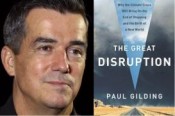 |
Paul Gilding says it’s time to stop worrying about climate change; global crisis is no longer avoidable. He believes the Great Disruption started in 2008, as spiking food and oil prices signaled the end of Economic Growth 1.0 based on consumption and waste. Coming decades will see loss, suffering and conflict, but he believes the crisis offers us both an unmatched business opportunity as old industries collapse to be replaced by new ones, and a chance to replace our addiction to growth with an ethic of sustainability.
Gilding has been involved with activist campaigns on a wide variety of issues and served as executive director of Greenpeace Australia and Greenpeace International. He founded Ecos Corporation in 1995, consulting to some of the world’s largest corporations on issues of sustainability until its sale in 2008. Gilding’s first book is The Great Disruption: Why the Climate Crisis Will Bring on the End of Shopping and the Birth of a New World.
Terrence McNally: Could you briefly talk about your path to the work you do today?
Paul Gilding: I started as an activist really very young. Age 14, 15, I got involved in a variety of issues and went on from there through 19 years of traditional activism, more on the human social side than the environmental side. Then through the late ’70s to early ’80s, I got involved in the anti-nuclear weapons and nuclear war movement. That led to a greater understanding of environmental issues, which then led to Greenpeace and very focused direct-action campaigns against corporate pollution. I ended up head of Greenpeace International.
I left there in the mid ’90s, focused on the role of markets and companies. How could we mobilize the power of markets as a force for good in this area? For the next 15 years I focused on that question, working in the corporate sector, running two companies that I built. Really trying to see if you can drive change through business — from the point of view of self-interest, recognizing that business is driven by making money. That’s their core metric.
Then about four or five years ago, I came to the conclusion that we really had done our best in the environmental and social change movements, but the ecological and system pressures we’d brought to bear on the global ecosystem were now in full flight. Change is going to be unstoppable.
